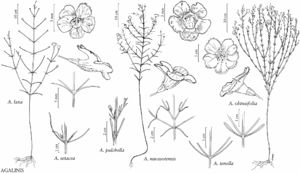Agalinis navasotensis
Sida 15: 426, figs. 1–7. 1993.
Stems branched, 25–80 cm; branches spreading-ascending, nearly terete proximally, obtusely quadrangular-ridged distally, glabrous or scabridulous distally. Leaves proximal to mid reflexed or recurved, distal spreading; blade filiform, (11–)17–30(–40) x 0.5–1.2 mm, not fleshy, margins entire, siliceous, abaxial midvein scabridulous, adaxial surface scabridulous; axillary fascicles absent. Inflorescences racemiform-paniculate, flowers 1 or 2 per node; bracts both longer and shorter than, or shorter than, pedicels. Pedicels ascending-spreading, (2–)6–25 mm, scabridulous proximally or glabrous. Flowers: calyx funnelform-obconic, tube 2.2–4.6 mm, glabrous, lobes triangular-subulate to subulate, 0.5–1.5 mm; corolla pink to rose, with 2 yellow lines and red spots in abaxial throat, 15–24 mm, throat pilose externally and glabrous within across bases of adaxial lobes, sparsely villous at sinus, lobes spreading, 5–7 mm, equal, glabrous externally; proximal anthers parallel to filaments, distal perpendicular to filaments, pollen sacs 2–3.2 mm; style exserted, 11–15 mm. Capsules ovoid to obovoid-oblong, (4–)6–7 mm. Seeds dark brown, 0.8–2.3 mm. 2n = 26.
Phenology: Flowering Sep–Oct.
Habitat: Rocky prairie remnants on sandstone outcrops, sandy clay soils of longleaf pine savannas.
Elevation: 90–100 m.
Distribution
Tex.
Discussion
Agalinis navasotensis is known from Grimes and Tyler counties in eastern Texas; it should be looked for elsewhere in eastern Texas and northwestern Louisiana. Agalinis navasotensis differs from A. caddoensis by subtleties of its calyx shape, leaf length, corolla length, inflorescence form, and offset pollen sacs. Additional collections may show that A. navasotensis and the morphologically similar, but poorly known, A. caddoensis of western Louisiana are conspecific.
Agalinis navasotensis is in the Center for Plant Conservation’s National Collection of Endangered Plants.
Selected References
None.
